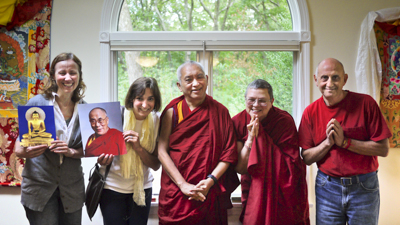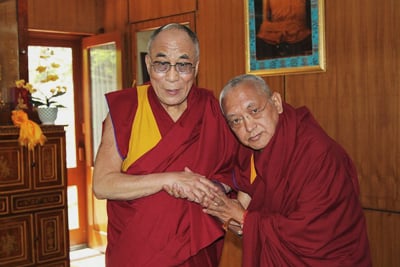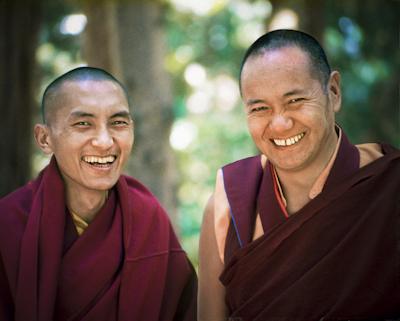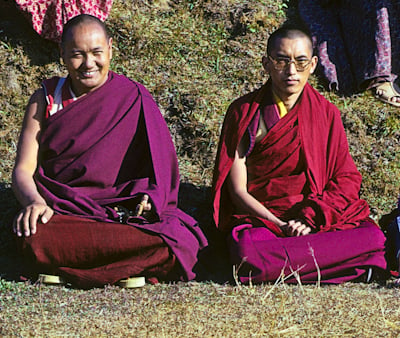Dear LYWA friends and supporters,
Thank you for receiving and reading our e-letter.
Supporting the LYWA Family
Here at the Archive things are going well, thanks to your generous support. Your kindness and concern for all sentient beings allow us to publish free books, produce DVDs and maintain our website and thereby make the holy Dharma freely available to all. Thank you so much.
As you may know, we have just published a couple of new DVD programs, Freedom Through Understanding and Life, Death and After Death, which are companions to the free books with the same titles. Much of the sponsorship we receive is directed toward specific books or projects, such as our Publishing the FPMT Lineage project or Lama Yeshe's biography Big Love. Such donations are therefore restricted to the projects for which they were offered.
Much of the sponsorship we receive is directed toward specific books or projects, such as our Publishing the FPMT Lineage project or Lama Yeshe's biography Big Love. Such donations are therefore restricted to the projects for which they were offered.
However, we also have a great need for unrestricted funds to support our infrastructure, especially our administrative staff, without whom we could not function. These skilled people work for less than market wages overseeing our several editors, maintaining our audio and transcript archive, keeping our accounts in order, developing our amazing website, preparing our books for the various kinds of e-readers that now abound, and so forth. There is a huge amount of work that happens behind the scenes and is in general harder to fund than books or other specific projects. Therefore, this time, we are asking for your help to keep this part of the Archive running smoothly.
Our goal for this midyear appeal is $50,000. We would be most grateful if you would help us reach it as soon as possible. Just visit our Donations page and indicate that your donation is a "General Donation." In recognition of donations of $100 or more, we will send you one of our new DVDs, a copy of a sutra, or another of our publications that we haven't sent you previously -- a surprise gift!
What's New On Our Website
There were 15 new advices added to Rinpoche's Online Advice Book, including advice for Purifying Negative Karma, on The Benefits of Blessing Strings, on Giving Up Lay Vows, and about Dharma and Worldly Activities such as the proper way to display mantras and other dharma messages. You can see a list of all new advices added in July here, or use the box on the right-hand side of every Advice Book page to see the list of newly added advices for any month in the past couple of years.
We have also posted the Swedish translation of Lama Yeshe's teaching Bodhicitta: the Perfection of Dharma. And, Aryatara Publications has recently printed a German translation of Rinpoche' Virtue & Reality. You can see a listing and access links to translations of our publications in 12 different languages on our website.
 We have recently posted the entire transcript of Lama Zopa Rinpoche's teachings from the 8th Kopan Course in 1975. In this course Rinpoche gave a full commentary of the "Everflowing Nectar of Bodhicitta" practice, a text composed by Lama Zopa Rinpoche that combines the Eight Verses of Thought Transformation with Avalokiteshvara practice. An excerpt from this commentary is included below as our e-letter teaching for this month.
We have recently posted the entire transcript of Lama Zopa Rinpoche's teachings from the 8th Kopan Course in 1975. In this course Rinpoche gave a full commentary of the "Everflowing Nectar of Bodhicitta" practice, a text composed by Lama Zopa Rinpoche that combines the Eight Verses of Thought Transformation with Avalokiteshvara practice. An excerpt from this commentary is included below as our e-letter teaching for this month.
Interestingly enough, at the recent Kalachakra initiation in Washington DC, His Holiness the Dalai Lama mentioned the importance of the Eight Verses of Thought Transformation text. He said he recites it from memory every day and also he meditates on it while waiting at airports! The flight is delayed one hour? No problem; meditate on the Eight Verses. A further delay? More meditation. Great Advice! You can read His Holiness’s commentary on this text on our website, and see a Swedish translation of this text as well.
Our Precious Lamas
Lama Zopa Rinpoche has recently composed a new dedication prayer, Remembering the Kindness of His Holiness the Dalai Lama and the Tibetan People. It was offered to His Holiness in Australia during his visit there in June this year.
We haven’t had any special news for the past couple of weeks regarding Lama Zopa Rinpoche's ongoing recovery from his stroke, but you can follow Rinpoche’s progress here.
We also received the sad news from Kopan that the Monastery’s beloved former abbot (he resigned July 10) Khensur Rinpoche Lama Lhundrup is now in an advanced stage of cancer. Lama Zopa Rinpoche advised that it would be very beneficial for Khenrinpoche if those who have karmic connections with him (eg. have received advice, oral transmission, other teachings, or taken refuge with him) can do the Ksithigarba practice as many times as possible.
Thank you again for all your kind support of our work.
Much love,
Nick Ribush
Director
This Month's Teaching: The Eight Verses of Thought Transformation
(See the course transcript for commentary on the entire text.)
"When in the company of others, may I always consider myself the lowest of all and from the depth of my heart hold them dear and supreme."
After that, again make purification. Repeat the visualization of the nectar, especially purifying the obscurations that prevent you from holding others dear and supreme and again bringing the realizations of how to do this. Bringing the realizations in the mind, the power and the realization, especially to always keep others high. Besides other realizations. If this is a little bit complicated, then visualize as you did for the first visualization. You can do this similarly, if the second visualization is too complicated.
Third verse:
"Vigilant, the moment a delusion appears endangering myself and others, may I confront and avert it without delay."
As one of my gurus, from whom I received this teaching, told me, this means that when a thief or enemy is outside your door, and you know he’s nearby, then you just avert it—you smash him, you destroy him. As soon as you recognize that he is coming to your house, you destroy him. You do not let him come inside your house. Just like this, don't let the mind generate a delusion; avert the delusion. It's as if a thief or someone else is coming, and you are holding a very, very heavy, big hammer and waiting, then as soon as the thief comes, you completely smash his head, breaking his brain into hundreds of pieces by hitting him once. If your meditation technique is powerful enough, you can destroy the delusion like this.
Fourth verse:
"Whenever I see beings of wicked nature who are overwhelmed by violent, negative actions and sufferings, may I hold such rare ones dear, as if I had found a precious treasure."
You may find this verse is a little bit difficult to understand. Other verses may be easier. "Negative, the wicked nature in the mind" doesn’t mean physical things. "Wicked nature" means very, very cruel, incredible cruel, negative action. These negative actions are the worst karma. The five heinous actions, including killing an arhat, killing a holy being or killing one's parents, create the worst negative karma. There is great suffering and besides that, the mind is so negative and incredibly cruel, and also, so negative and selfish. Besides creating the worst negative karma, people also become physically sick and the whole body is full of epidemic disease or sores that spread around, like leprosy. People suffer from the worst, most dangerous diseases, like leprosy. "May I hold such rare ones dear as if I had found a precious treasure" means like that kind of person. Anyway, I will talk a little bit on this. You may have the question, "All sentient beings are precious, why is this specific person precious? Why should I think this person is precious, specifically?" It is very good if I talk a little bit on just this point and not explain the others.
By seeing this person with all three things like this—having a wicked nature, by all his actions he has created incredible, unbearable suffering, so he becomes the object of your compassion. Compassion easily rises and from this, bodhicitta arises. You receive bodhicitta and from this, you receive enlightenment. So, this is like the other explanation that I already did. But if you’re not introduced, you cannot understand the meaning of this. So therefore, think, "My receiving enlightenment, all my realizations come from him." For example, bodhisattvas and arhats— those high bodhisattvas who have not received enlightenment are sentient beings, but you don’t feel compassion for them. Holy beings who have not received enlightenment, for example, arhats who are out of samsara, although they are still sentient beings, you don’t feel compassion for them. You find it easy to feel compassion for suffering beings, like wounded dogs. Even the terribly wounded dogs that are almost dying and can’t move their body, they have broken legs, it is easy to generate compassion toward these beings, more so than towards that other person who has many possessions, who has everything. It is difficult to generate compassion towards that person, but it is easy to generate compassion and bodhicitta on the basis of these suffering sentient beings.
So therefore, the teaching mentions that this person is "precious like a jewel." As it’s explained in the teaching, the jewel itself is dirty when we first take it from the ocean. The jewel itself cannot remove the dirt, but after you clean it and you pray, you receive all the temporal perfections and happiness from that. Like this, sentient beings cannot help themselves get out of the suffering, but they become the basis from where you receive enlightenment and all your realizations and happiness. They are the basis of your compassion and bodhicitta. Similarly, when you find a wish-fulfilling jewel, because of the preciousness and the benefits , you don’t throw it out. You take care of it as best as possible, because of the benefits. Just like this, when you see a a sentient being suffering like this, you should not run away. You should not consider him as an enemy and run away. You should not think, "Oh, I will get his disease. Oh, he is terrible. I can't look at him. I can't help him, I can't go nearby." You should not feel he is the enemy. Don’t run away. Take care of him and hold him most dear. When this person is found, hold him most dear, like a difficult-to-find jewel.
For a normal person, receiving all the temporal pleasure and perfections, whatever he wants to receive easily, is very difficult. That’s why finding a jewel is so precious. It’s very difficult to find and precious. Like this, receiving enlightenment, bodhicitta, all these things, is very rare, very difficult. The best person from whom we can receive compassion, bodhicitta—this person on whom we can easily generate, receive these realizations is also very precious. So we should hold this person as the most dear.
The way of helping this person is, first, if you can help through words, through communication. And if there’s no way to help through communication, there may be another way to help with materials, food or other things. Even if that is impossible, then make tonglen practice and take his suffering. Make tonglen practice, the mental practice, dedicating your happiness and merits, everything—for his happiness, for his receiving enlightenment, for his release from samsara— and take all his present and future suffering and all the negative karma, everything. Try to help him in this way and mentally try to benefit him with your pure thought of bodhicitta.
Fifth verse:
"When out of envy, others mistreat me with abuse, insult or dislike, may I accept the defeat and offer the victory to others."
This includes many other things besides abuse and insults.
Sixth verse:
"When someone I have benefited and in whom I have great hopes gives me terrible harm, may I regard him as my holy guru."
These are very powerful words and there is also much to say about this verse. By depending on the guru, you receive teachings and you receive realizations, and enlightenment. You can look at this sentient being in a similar way as your guru, because by depending on this sentient being, by training the mind like this, on the basis of these sentient beings, you can learn patience. You can learn the six paramitas from them. On the basis of them, you can develop your practice, you can receive bodhicitta, you can receive the whole path and receive enlightenment. So they are also, in another way, like the guru and you can look at sentient beings as the guru, like this. Whatever is said here, I am directly explaining it like this.
Seventh verse:
"In short, both directly and indirectly do I offer every benefit and happiness to all my mothers. May I secretly take upon myself all their harmful actions and sufferings."
"Secretly" can be "indirectly" —there are different meanings explained in the teachings. "Directly" means present happiness, so you are dedicating for all the present perfections and happiness. "Indirectly" means although you have created karma now, the resulting perfection and happiness is not received yet, but also even the future happiness that will be received, you are dedicating this for sentient beings indirectly. "Indirectly" can also be understood in this way. "Secretly" means tonglen practice done by mind. You can also help physically as best you can, to release others’ suffering. But secretly, also mentally, you can do the tonglen practice, taking other sentient beings’ suffering mentally. If physically it can’t be done, then secretly take their suffering like this. If you can really stop other beings’ sufferings with your physical actions, then do that. If not, then secretly, mentally, take their suffering by practicing tonglen—taking other sentient beings’ suffering. Also this means that tonglen practice is very secret —it is only an action of your mind and it does not depend on the body. Your body can be doing anything, not looking like it is practicing Dharma, but your mind is living in Dharma practice. Other people can’t see tonglen. They can’t see if another person is practicing Dharma. Making prostrations and mandala offerings is different from tonglen. Tonglen is a very good practice because it’s very difficult to get involved with the self-cherishing thought, the evil thought of worldly dharma, and because other people cannot see your mind's action.
Eighth verse:
"Undefiled by the stains of the superstitions of the eight worldly dharmas, by perceiving all dharmas as illusory, may I be released from the bondage of attachment."
All these practices include praying to not be possessed by the eight worldly dharmas. De dag kün kyang chhö gyä kyi / Tog päi dri mä ma pag shing / Chhö kün gyu mar she päi lö /Zhen me chhing wa lä dröl shog. "By not seeing the existence as illusory," perceiving this as truly existent, as absolutely existent, makes you generate attachment and clinging to yourself, your possessions and to others. So, that is the bondage of the attachment and wrong conception that binds you in the samsara. So, then pray, "By perceiving all dharmas as illusory, may I be released from the bondage of attachment."
Kyabje Lama Zopa Rinpoche gave this teaching at the 8th Kopan Course held at Kopan Monastery, Nepal, in 1975. This teaching is an excerpt from Lecture Thirty-Five of the course.
































